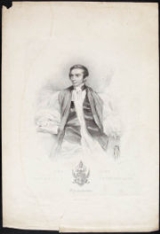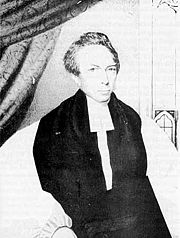
Aubrey George Spencer
Encyclopedia
Bishop Aubrey George Spencer (12 February 1795 – 24 February 1872) was the first bishop of the Anglican Diocese of Newfoundland
and Bermuda
(1839–1843). He was also bishop of Jamaica.
. He was educated at St Albans School
, and privately in Greenwich prior to joining the navy. His health failed him, he was discharged, and he decided to become a priest. Spencer went to study at Magdalen Hall, Oxford and was made deacon in 1818. He was ordained a priest in 1819 by the Bishop of Norwich. His first assignment was officiating as a curate at Prittlewell, Essex, before becoming a Society for the Propagation of the Gospel missionary to Newfoundland. There he served at Ferryland and Trinity Bay before the cold undermined his health and he moved to Bermuda. Having been appointed Archdeacon and Rector of Paget and Warwick, he published a collection of his sermons, acquired a Lambeth D.D. and turned down in 1829 the offer of the Archdeaconry of Newfoundland. In 1839, he readily accepted when, perhaps helped by his aristocratic and Whig connections, he was offered the bishopric of Newfoundland. He was consecrated Bishop of Newfoundland alongside John Strachan
the first Bishop of Toronto
. Their consecration took place at the chapel in Lambeth Palace
4 August 1839. William Howley
, being archbishop of Canterbury, with Bishops Charles James Blomfield
of London, William Otter of Chichester, and John Inglis of Nova Scotia participated in Spencer's consecration.
 Spencer was described by Prowse, the 19th century Newfoundland historian, as "an evangelical of the old school of Wilberforce
Spencer was described by Prowse, the 19th century Newfoundland historian, as "an evangelical of the old school of Wilberforce
and Bickersteth." He had little time for dissent, and the Methodists were quick to attack his making the Newfoundland School Society an auxiliary of the church, accusing him of having "high and exclusive claims", and of influencing the younger generation and "infusing into their minds the common notions of the high church party". They were surprised that Spencer's Anglicanism, although low church
, did not favour them. Had they read his sermon preached in St John's, they would have realised that not only was he very anti-Tractarian and anti-Catholic, he also insisted on the Church of England having its ministry from the Apostles and condemned those who rejected forms and undervalued the sacraments. Part of Spencer's legacy to his successor, Edward Feild
, was thus rather poor relations with the Methodists.
, that the Church of England was merely a part or branch of the catholic Church of Christ
, that all other Christians in England were in error, that Auricular Confession was inadmissible in the Church of England, that there should be no adoration of the consecrated bread and wine at communion, and that a branch of the Church without bishops was still a church. It was very traditional and very Protestant. His long illness caught up with him and in 1872 Spencer died.
Newfoundland and Labrador
Newfoundland and Labrador is the easternmost province of Canada. Situated in the country's Atlantic region, it incorporates the island of Newfoundland and mainland Labrador with a combined area of . As of April 2011, the province's estimated population is 508,400...
and Bermuda
Bermuda
Bermuda is a British overseas territory in the North Atlantic Ocean. Located off the east coast of the United States, its nearest landmass is Cape Hatteras, North Carolina, about to the west-northwest. It is about south of Halifax, Nova Scotia, Canada, and northeast of Miami, Florida...
(1839–1843). He was also bishop of Jamaica.
Life
George Spencer was born at London, England. He was the son of the Honourable William Spencer, a direct descendant of the Duke of Marlborough, his German mother Susan being a Countess of the Holy Roman EmpireHoly Roman Empire
The Holy Roman Empire was a realm that existed from 962 to 1806 in Central Europe.It was ruled by the Holy Roman Emperor. Its character changed during the Middle Ages and the Early Modern period, when the power of the emperor gradually weakened in favour of the princes...
. He was educated at St Albans School
St Albans School (Hertfordshire)
St Albans School is an independent school in the city of St Albans in Hertfordshire, in the East of England. Entry before Sixth Form is for boys only, and co-educational thereafter. Founded in 948 by Wulsin , St Albans School is not only the oldest school in Hertfordshire but also one of the oldest...
, and privately in Greenwich prior to joining the navy. His health failed him, he was discharged, and he decided to become a priest. Spencer went to study at Magdalen Hall, Oxford and was made deacon in 1818. He was ordained a priest in 1819 by the Bishop of Norwich. His first assignment was officiating as a curate at Prittlewell, Essex, before becoming a Society for the Propagation of the Gospel missionary to Newfoundland. There he served at Ferryland and Trinity Bay before the cold undermined his health and he moved to Bermuda. Having been appointed Archdeacon and Rector of Paget and Warwick, he published a collection of his sermons, acquired a Lambeth D.D. and turned down in 1829 the offer of the Archdeaconry of Newfoundland. In 1839, he readily accepted when, perhaps helped by his aristocratic and Whig connections, he was offered the bishopric of Newfoundland. He was consecrated Bishop of Newfoundland alongside John Strachan
John Strachan
John Strachan was an influential figure in Upper Canada and the first Anglican Bishop of Toronto.-Early life:Strachan was the youngest of six children born to a quarry worker in Aberdeen, Scotland. He graduated from King's College, Aberdeen in 1797...
the first Bishop of Toronto
Toronto
Toronto is the provincial capital of Ontario and the largest city in Canada. It is located in Southern Ontario on the northwestern shore of Lake Ontario. A relatively modern city, Toronto's history dates back to the late-18th century, when its land was first purchased by the British monarchy from...
. Their consecration took place at the chapel in Lambeth Palace
Lambeth Palace
Lambeth Palace is the official London residence of the Archbishop of Canterbury in England. It is located in Lambeth, on the south bank of the River Thames a short distance upstream of the Palace of Westminster on the opposite shore. It was acquired by the archbishopric around 1200...
4 August 1839. William Howley
William Howley
William Howley was a clergyman in the Church of England. He served as Archbishop of Canterbury from 1828 to 1848.-Early Life, education, and interests:...
, being archbishop of Canterbury, with Bishops Charles James Blomfield
Charles James Blomfield
Charles James Blomfield was a British divine, and a Church of England bishop for 32 years.-Early life:Blomfield was born in Bury St Edmunds, Suffolk and educated at the local grammar school and at Trinity College, Cambridge, where he won the Browne medals for Latin and Greek odes, and the Craven...
of London, William Otter of Chichester, and John Inglis of Nova Scotia participated in Spencer's consecration.
Bishop of Newfoundland
In Newfoundland he increased the number of clergy by offering stipends guaranteed by the Society for the Propagation of the Gospel, built schools and new churches, and laid the foundation stone for a cathedral. He reorganized the church into rural deaneries, revived the Diocesan Church Society to raise money, and formed a Theological Institute to produce a local ministry. To increase the number of clergy he ordained schoolmasters belonging to the Newfoundland School Society. He obtained control of that society by becoming a Vice-President, licensing its schoolmasters (if not ordained) to act as lay readers, and appointed the Rev. T. F. H. Bridge, his ablest assistant, to act as its local Superintendent. He described the society, in its 21st Annual Report, as "the greatest bulwark of the Protestant faith in that dreary and benighted land".
William Wilberforce
William Wilberforce was a British politician, a philanthropist and a leader of the movement to abolish the slave trade. A native of Kingston upon Hull, Yorkshire, he began his political career in 1780, eventually becoming the independent Member of Parliament for Yorkshire...
and Bickersteth." He had little time for dissent, and the Methodists were quick to attack his making the Newfoundland School Society an auxiliary of the church, accusing him of having "high and exclusive claims", and of influencing the younger generation and "infusing into their minds the common notions of the high church party". They were surprised that Spencer's Anglicanism, although low church
Low church
Low church is a term of distinction in the Church of England or other Anglican churches initially designed to be pejorative. During the series of doctrinal and ecclesiastic challenges to the established church in the 16th and 17th centuries, commentators and others began to refer to those groups...
, did not favour them. Had they read his sermon preached in St John's, they would have realised that not only was he very anti-Tractarian and anti-Catholic, he also insisted on the Church of England having its ministry from the Apostles and condemned those who rejected forms and undervalued the sacraments. Part of Spencer's legacy to his successor, Edward Feild
Edward Feild
Bishop Edward Feild was a university tutor, university examiner, Anglican clergyman, inspector of schools and second Bishop of Newfoundland, born Worcester, England...
, was thus rather poor relations with the Methodists.
Final years
He was once again troubled by ill health and in consequence obtained his translation to Jamaica where he was bishop until 1855. He then retired to England, to Torquay, and he occasionally assisted the aging Bishop of Exeter, Phillpotts. His last publication, A Brief Account of the Church of England, its Faith and Worship: as shown by the Book of Common Prayer, published in 1867, was circulated in Spanish and Italian by the Anglo-Continental Society, and was a decidedly Protestant work. It declared that the reformers had aimed to maintain apostolic successionApostolic Succession
Apostolic succession is a doctrine, held by some Christian denominations, which asserts that the chosen successors of the Twelve Apostles, from the first century to the present day, have inherited the spiritual, ecclesiastical and sacramental authority, power, and responsibility that were...
, that the Church of England was merely a part or branch of the catholic Church of Christ
Christian Church
The Christian Church is the assembly or association of followers of Jesus Christ. The Greek term ἐκκλησία that in its appearances in the New Testament is usually translated as "church" basically means "assembly"...
, that all other Christians in England were in error, that Auricular Confession was inadmissible in the Church of England, that there should be no adoration of the consecrated bread and wine at communion, and that a branch of the Church without bishops was still a church. It was very traditional and very Protestant. His long illness caught up with him and in 1872 Spencer died.
External links
- Biography at the Dictionary of Canadian Biography Online
- Contemporary obituary from Project CanterburyProject CanterburyProject Canterbury is an online archive of material related to the history of Anglicanism. It was founded by Richard Mammana, Jr. in 1999, and is hosted by the non-profit Society of Archbishop Justus...
- Aubrey George Spencer
- Sermon Good Friday, 1842

